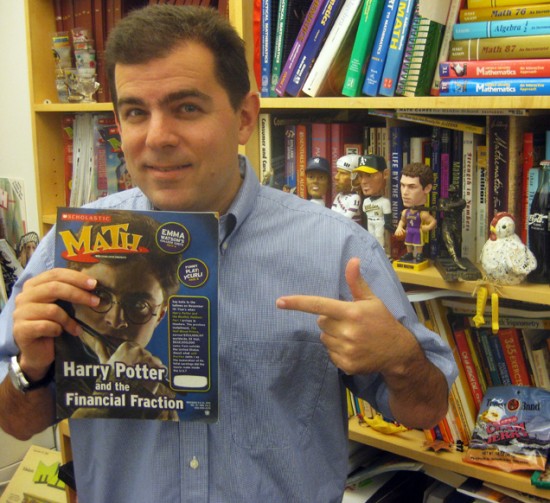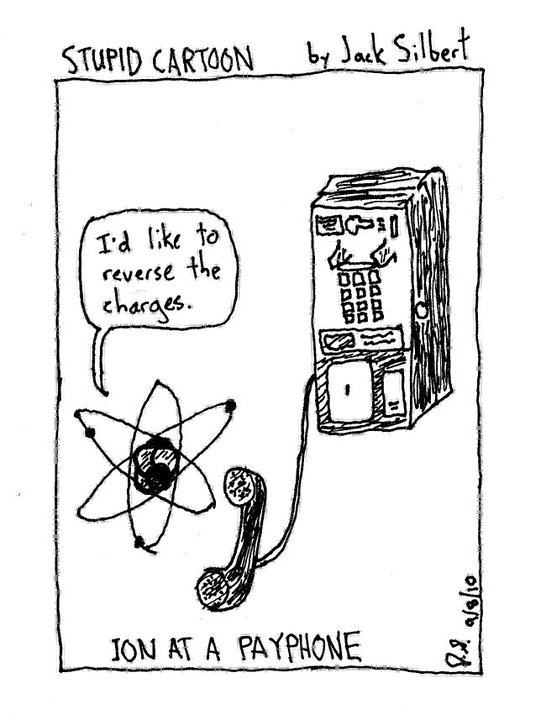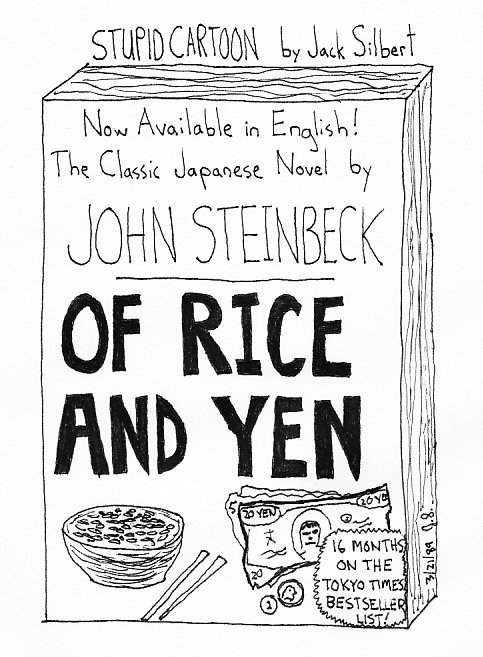Some people are Numbers People. Some people are Words People. But some rare individuals are both Numbers AND Words people…like Jack Silbert, today’s guest blogger and also the Associate Editorial Director of Scholastic’s MATH magazine. Not only does he fight math phobia everywhere, but he also writes books and essays, draws comics and is a pretty cool person. But enough from us…on to Jack.

Right now I edit MATH Magazine, which is used in middle-school classrooms nationwide. But having some sort of outside writing also plays a very important role in my career. I can look at myself in the mirror and say: “I’m a writer.”
As an editor with MATH Magazine, the goal is to make students not hate math quite so much and understand how it’s important to everyday life. I come up with story ideas – matching skills that teachers need to cover to high-interest current topics for teens. I write the table of contents for each issue and assign the articles to in-house writers and freelancers. Then I edit the articles! I work with the photo editor and art director to decide what each article will look like. I feel we’re doing important work, and that’s satisfying. So many of my fellow “humanities types” take pride in not being able to do math. That’s embarrassing. You’d never hear a scientist or mathematician brag about not being able to read. I like fighting the math phobia that is so prevalent, even in the adult world.
 I started working at Scholastic about ten months after graduating with a degree in Creative Writing at Carnegie Mellon University. In college I also had a campus job at the University Press, sifting through submitted poetry manuscripts. Two things about that campus job were invaluable: one, it really opened my eyes that there were careers in the publishing field that weren’t solely writing, and that would make my parents happy! The other big thing was that it led to an internship with Scholastic’s classroom math magazines. After my internship I was hired as an assistant editor with Scholastic’s classroom math magazines, and then became an associate editor, and then editor….
I started working at Scholastic about ten months after graduating with a degree in Creative Writing at Carnegie Mellon University. In college I also had a campus job at the University Press, sifting through submitted poetry manuscripts. Two things about that campus job were invaluable: one, it really opened my eyes that there were careers in the publishing field that weren’t solely writing, and that would make my parents happy! The other big thing was that it led to an internship with Scholastic’s classroom math magazines. After my internship I was hired as an assistant editor with Scholastic’s classroom math magazines, and then became an associate editor, and then editor….
While I think I’m pretty good at editing, writing has always been my true passion. I’ve been writing as long as I remember. My writing started with rudimentary comic strips when I was a little kid, like Willie the Unscary Ghost. In 5th grade I was finishing spelling tests early and would draw installments of a comic strip – Banana Man and the Strawberry Twins – at the bottom of the page. I also drew a comic strip for my college newspaper entitled Stupid Cartoon. Since then I’ve worked on a wide variety of writing projects, including: the picture book The Christmas Aliens, a book of American History Comics for kids, and for several years I was a regular contributor to the New Jersey section of the New York Times. Also, whenever I travel anywhere overnight, I write in a journal. When I started doing this it was revelatory. I wasn’t writing for an audience; I was just writing for me. I felt like I fell in love with writing again.
The biggest difference between writing and editing is that while a lot of writing is ego-based, editing should really never be. The editor’s touch shouldn’t be visible. Respect the writer’s voice and maintain as much of that as you can. Changes you make are only at the service of the reader – making a piece clearer. But that’s not to say there are no similarities. A good editor knows how a story unfolds, as a good writer does. You want a strong beginning, a strong ending, and the stuff in the middle should follow in a logical order.

I think some general advice to all writers is: read a lot, because it will make you a better writer. I alternate reading fiction, nonfiction, music magazines or some “lighter” books – The Complete Peanuts, for example. The plainspoken fiction I was introduced to in college still really appeals to me: Raymond Carver, Tobias Wolff, Richard Ford. For nonfiction I’m crazy about John McPhee. He picks these topics that you’re sure are going to be boring (like bark canoes) and he finds interesting stories to tell about them. The ability to share posts on Facebook is also great, because you don’t feel like you’re writing into a black hole.
But my best advice is that if you want to be a writer, make sure you enjoy it. With writing, you know there is always disappointment waiting around the corner: the teacher can give you a bad grade, or the literary journal can reject your submission. Or a magazine will accept your submission (awesome!), but the editor will change what you wrote. This will happen over and over again.
So take satisfaction from each step of the process. First and foremost, are you happy with what you wrote? That’s really what matters. And if you ever become a bestselling author and sell 37 million books…I hate you and I resent your success and I think you’re totally overrated. Seriously, enjoy what you do, and the act of writing will always give you sustenance.
